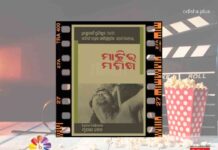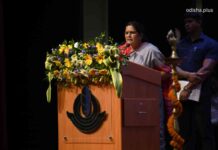Sambeet Dash

Thousands salute and tribute to the man for his service to the state of Odisha on his 177th birthday
If he wasn’t born in Odisha on this day of 13th January of 1843, we would be reading and speaking Bengali today. Fakir Mohan Senapati, an Odia legend was way ahead of his time. He was a writer, patriot and a shrewd strategist rolled into one who fought for Odia language which was on the verge of extinction at that time.
Had he not been there, in all probability Bengali would have taken over Odia as the medium of teaching in the state where Odia is the mother tongue of the overwhelming majority. Many eminent Bengalis at the helm of affairs those days living in Cuttack led by Anandilal Mitra made this fallacious proclamation – ODIA EKTAA SWATANTRA VASA NAYE, “Odia is not an independent language”.
Fakir Mohan fought tooth and nail against this wrong notion. He started an Odia printing press and publishing books in our native language. Odia survived, thanks to his efforts and the likes of Gourishankar Ray and Madhusudan Das.

Fakir Mohan’s life was a story of personal tragedies and struggle. Born in the district of Balasore, he lost his parents at an early age, then working as a laborer to finance and further his childhood education. A lanky man of small frame he suffered from multiple ailments. Tragedies struck him time and again as he lost his wife, remarried and lost his wife again. He went through bouts of alcoholism to cover up his frustrations with his life.
He did lots of odd jobs to make a living – doing Salt business, working as an accountant and being DEWAN (Prime Minister) of Vassals and Zamindars (Landowners). Though never financially secure, it didn’t stop him from writing some brilliant short stories – from serious ones like REBATI where a girl child’s education was blamed for cholera deaths in her family to funny ones like PATENT MEDICINE, the story of a perpetually drunk servant later immortalized by its musical version made by the multi talented Akshaya Mohanty.
Personally I was impressed by his short story DHULIA BABA (The Sand Shrouded Saint). In that epic story the writer has exposed the duplicacy of a BHANDA BABA (fake mendicant). He also wrote poetry and did translation works from Sanskrit.
Fakir Mohan realized that Odia language can be taken to the next level by popularizing its literature through various publications. His friend Gourishankar Ray published an Odia magazine UTKAL DIPIKA (The Lamp of Odisha) for the first time on August 4, 1866. They left no stones unturned by reporting the failure of British administration to prevent and contain the great famine of 1865-66 when millions died from starvation.
Mr. Senapati had a weakness for alcohol. He loved Brandy and had a good number of English friends who supplied him this Foreign brand. One cold winter evening of 1866 there was a hot discussion amongst drinking buddies inside the exclusive Station Club of Cuttack. They were pulling legs of E J Barton, the Assistant Collector of Khurda who was accused by a woman of fathering her daughter in an age sans contraceptives.
Folks believed her, for the little girl was looking like an English Mem with her sparkling blue eyes and reddish white skin – a genetic trait nowhere close to the generally dark complexioned Khurda men. The case was eventually dismissed for the lack of evidence at a time when DNA test was strictly fantasy.
This news about the blue eyed girl came like a bolt from the blue on that blue, starry evening at the Club as gossip filled tongues kept wagging about the spicy incident in the milieu of the bland, mundane life of the government officials. The news which was picked up by Utkal Dipika was arguably the first tabloid scoop by an Odia magazine.
Fakir Mohan was smart and witty. While working as Dewan in Keonjhar he was kept under house arrest by mutineers. He was closely monitored, not allowed any communication to the outside world. He wrote a letter to one of his close friend – ” Dear Bholanath Khamaria. Send me 100 betel and 100 betel nuts. Irrigate the sugarcane fields by watering from North. Otherwise, you will lose the entire field of crop”.
The letter looked innocuous. His captors duly sent it to the intended addressee. Needless to say betel was the code for guns and nuts for bullets. The instruction was to attack from the north, lest the sugarcane field (the palace) will be destroyed. The recipient decoded wily Fakir Mohan’s note and soon sent armed soldiers to rescue him.
Sad that the name a statesman of great stature now languishes in the dustbins of history, restricted only to a Government College in Balasore named after him. Hardly anyone remembers him these days. My thousands salute and tribute to the man for his service to the state of Odisha on his 177th birthday.
(Sambeet Dash is an Odia technocrat living in Georgia ,US)


























Very informative and fascinating. Fakir Mohan Senapati should really be talked about more often.